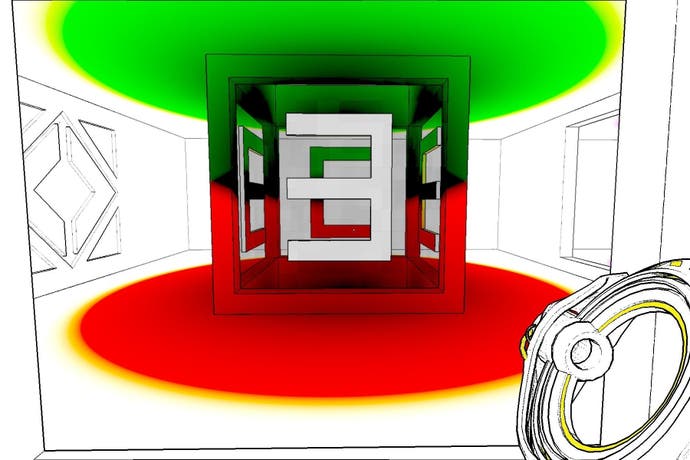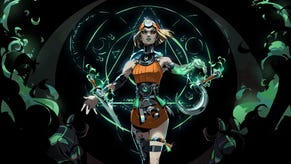Antichamber review
Trick or treat?
Alexander Bruce's Antichamber is a game that delights in its own inhumanity. It's a wilfully cruel first-person puzzle game that loves to trick the player with rule changes, visual sleights, false walls and impossible spaces as well as some testing logic problems. Visually, it couldn't be any more stark - it's etched in hard, angular monochrome and splashed with lurid neon - while the soundtrack of whining wind and distant animal calls is pure doomy alienation.
There's one incongruous human touch in all this lab-engineered intellectual torture. After defeating a puzzle, you'll find a sketchy allegorical cartoon on the wall: a dog chasing its own tail, maybe, or a man pushing a stone up a mountain. Click on it and you'll read a cheesy motivational slogan straight off some kitten-festooned office poster: "Dig a little deeper and you may find something new," or "If you never stop trying, you will get there eventually." Usually these reflect on the puzzle you've just solved. I can't tell if their use is supposed to be ironic or not - but it's irritating either way. It comes across as Bruce condescendingly reminding you that he's always one step ahead.
Antichamber is a deeply self-conscious game, then, and it's a bit smug with it. It's very clever, it's very pleased with its own cleverness, and it's unwilling to let you enjoy a sense of victory over it. It also has an inconsistency that provides it with many entertainingly trippy and confounding moments, but which ultimately makes it untrustworthy. And a puzzle game you can't trust is seldom that much fun.
You start the game in a black-walled chamber with the controls printed on the wall next to a clock ticking down from 90 minutes (this turns out to be another smartass joke). From here you enter the game's impossible maze, where a staircase can lead to its own foot, walls and floors can vanish when you touch them, a set of rooms can be both horizontally and vertically adjacent to each other, and pressing your face against a window can change where you're standing.
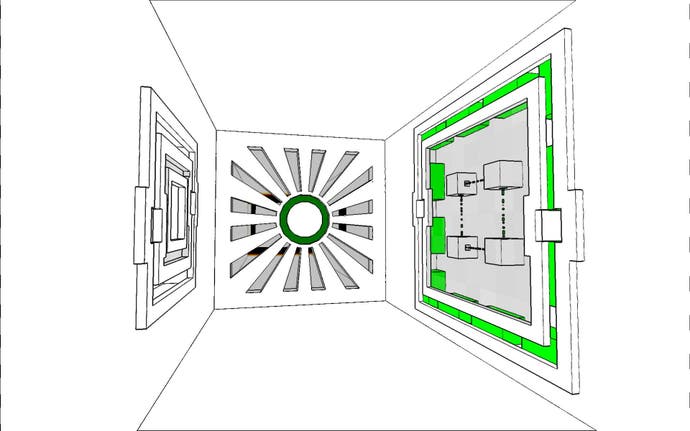
It's head-spinning stuff - like an entire world made of Portal's portals - and it's presented with terrific visual and technical confidence, all the more impressive considering that Bruce is a one-man band. It's fun to be surprised and have your perceptions fooled in this way, and some of the game's best moments come as you test the limits of this illogical labyrinth. This is Antichamber's signature, but the game has another side to it.
Soon you pick up a device - let's just call it a gun and be done with it - that allows you to collect and place coloured cubes by aiming at and zapping them with the left and right mouse buttons. These cubes are used in more conventional (though definitely still tough) puzzles, often involving using them to block off laser-triggered switches. These puzzles rapidly get more elaborate - exponentially so as your cube-gun acquires new colour-coded abilities that even change the behaviour of the cubes themselves.
This is where Antichamber starts to unravel. The spatial and logic puzzles themselves are well designed for the most part - difficult, but only rarely requiring unreasonable cognitive leaps or relying on unexplained systems. But there's an uncomfortable, dissonant clash between these logical posers, the resolutely illogical game space, and the lock-and-key nature of your upgrading cube gun.
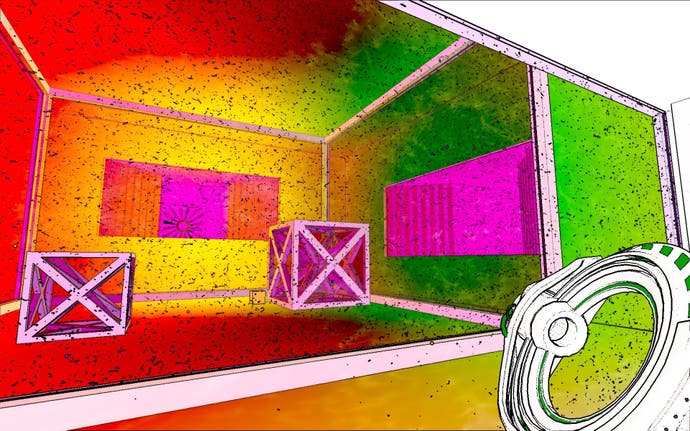
Unsurprisingly, Antichamber isn't a linear game. You will often find yourself bouncing off several puzzles simultaneously in different parts of the maze. But due to the game's love of its own inscrutability, you won't know whether you can't solve any one of them because it's an instance of the game breaking its own rules (as it loves to do), because you don't have the right tools yet, or simply because you haven't figured it out.
It's one thing to be stumped and another to be tricked, and these nagging feelings both have value in a puzzle game that's making a genuine attempt to test your intellect. But not knowing whether you're one or the other - or simply roadblocked - is the wrong kind of frustration, and it's all too familiar a feeling in Antichamber. Instead of applying yourself to the problem at hand, you hop restlessly between challenges, doubting which one you're supposed to tackle.
The game's liberal structure makes this easy to do. You can always get back to the entry point with a tap of the escape key, and here there's a helpful map that fills out as you play and gives you instant, one-click access to any puzzle chamber - indicated by a handy thumbnail and a title that might give you a hint to its solution. This map is something of a double-edged sword. It makes your progress through the game practical and swift where it could have been a terminally confusing spatial tangle - but it also robs Antichamber's star attraction, its enigmatic maze, of much of its power. It soon dissolves into a series of discrete brain-teasers that might as well be accessed from a menu.
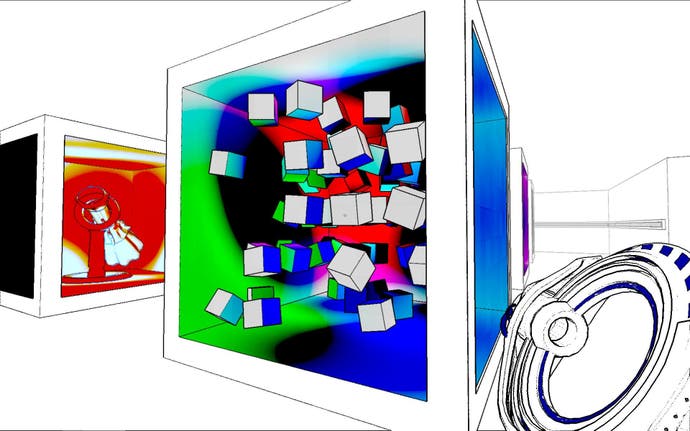
It's the strength of the challenges themselves that saves the game. The majority of Antichamber's puzzles appear impossible at first and obvious after you've solved them - just like any well designed puzzle should. Most mental roadblocks can be cleared by turning the game off and coming back to it with fresh eyes, while others respond well to a doodling kind of experimentation. As you move through the game, there's a pleasing crescendo to both the difficulty of the puzzles and the audacity of the game's dizzying visual trickery.
In the end, though, it left me cold. Antichamber's frosty and self-satisfied air is preferable to the chummy japery of Kim Swift's Quantum Conundrum, for sure - but both games have made a similar mistake in hiving off half of Portal's personality and expecting it to stand on its own. Valve's stroke of genius was to satirise its own arrogant intellectual cruelty by embodying it in the all-too-human computer GLaDOS, which both lightened the game with jokes and granted players the rich satisfaction of victory over a cold-blooded antagonist. In Portal, you're the lab rat who beat the system, broke the maze and took its revenge.
Antichamber, by contrast, revels in its mastery over you right until the very end. Bruce constantly reminds you of his ability to change the rules of your reality at whim. That might be a more truthful picture of the relationship between game and player, but the satisfaction it offers is hollow.
